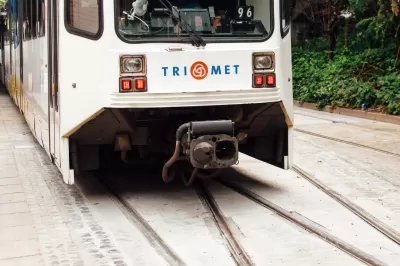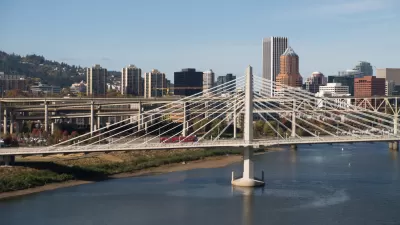A proposed rail line would run from downtown Portland, Oregon, to the suburbs. The budget has increased significantly, and many funding and project scope questions remain.

"Projected costs for TriMet’s next light rail project have increased by nearly half a billion dollars, creating a new budget gap that TriMet officials are optimistic can be addressed, but has raised alarm bells for some suburban leaders," writes Andrew Theen.
The planned line would be a 12-mile, 13-station route running from downtown Portland along a southwest corridor. The project cost has increased to $2.87 billion, an increase of about $462 million, notes Theen.
Officials in suburban districts say they will not support the project if the route is shortened or vehicle travel lanes are removed on Barbur Boulevard, a main thoroughfare, to cut project costs. Other options include eliminating some of the project’s park-and-ride lots or stations and using battery-electric trains instead of vehicles that require overhead equipment.
Theen says that the Metro Council has just $50 million of federal funds secured for the project. "The region will seek $1.25 billion from the Federal Transit Administration and will ask voters to contribute $850 million at the November 2020 ballot box. The state, city of Portland, TriMet and Washington County are all expected to contribute significantly as well, but the precise funding sources and firm commitments are still months away."
FULL STORY: Barbur light rail project faces $462 million funding gap, tough decisions loom

Planetizen Federal Action Tracker
A weekly monitor of how Trump’s orders and actions are impacting planners and planning in America.

Chicago’s Ghost Rails
Just beneath the surface of the modern city lie the remnants of its expansive early 20th-century streetcar system.

San Antonio and Austin are Fusing Into one Massive Megaregion
The region spanning the two central Texas cities is growing fast, posing challenges for local infrastructure and water supplies.

Since Zion's Shuttles Went Electric “The Smog is Gone”
Visitors to Zion National Park can enjoy the canyon via the nation’s first fully electric park shuttle system.

Trump Distributing DOT Safety Funds at 1/10 Rate of Biden
Funds for Safe Streets and other transportation safety and equity programs are being held up by administrative reviews and conflicts with the Trump administration’s priorities.

German Cities Subsidize Taxis for Women Amid Wave of Violence
Free or low-cost taxi rides can help women navigate cities more safely, but critics say the programs don't address the root causes of violence against women.
Urban Design for Planners 1: Software Tools
This six-course series explores essential urban design concepts using open source software and equips planners with the tools they need to participate fully in the urban design process.
Planning for Universal Design
Learn the tools for implementing Universal Design in planning regulations.
planning NEXT
Appalachian Highlands Housing Partners
Mpact (founded as Rail~Volution)
City of Camden Redevelopment Agency
City of Astoria
City of Portland
City of Laramie



























